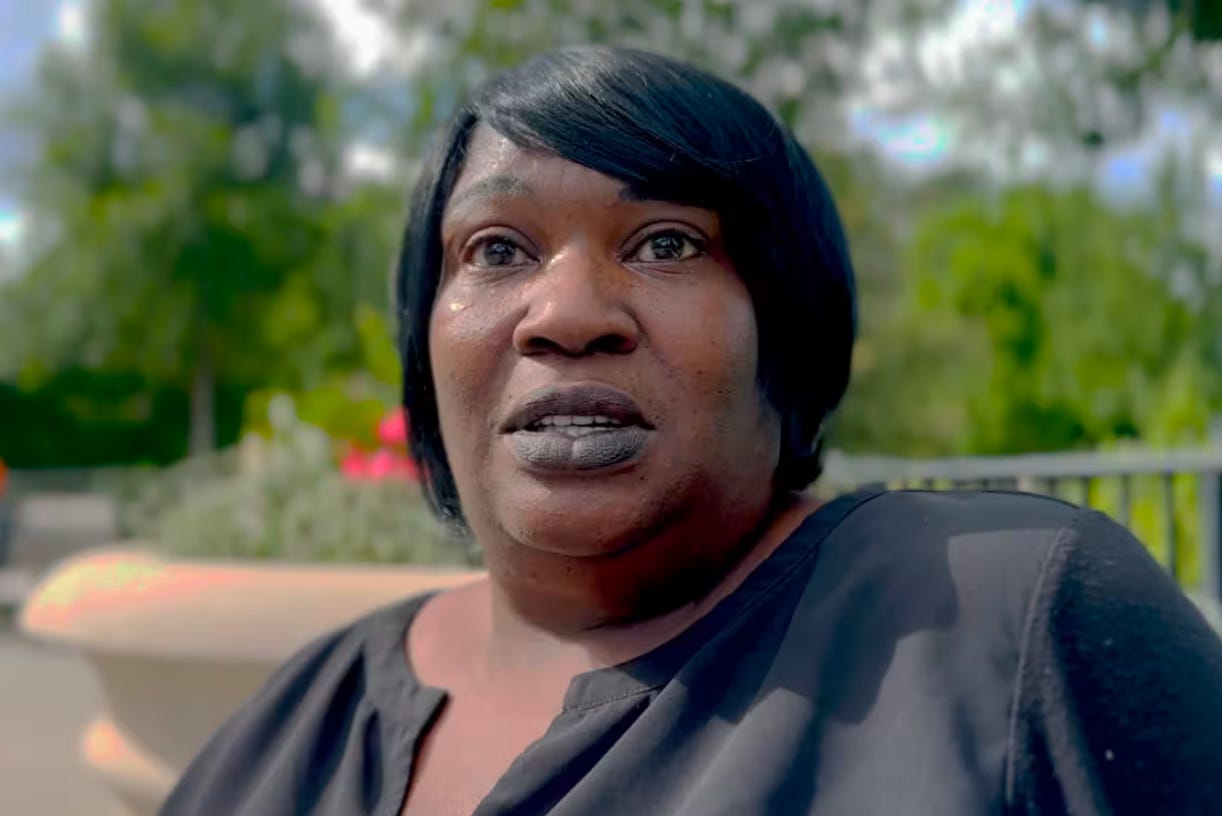The Case of Adriana Smith May Not Be What You Think
Her mother says the pregnant woman is being kept alive in Georgia because of its abortion ban.
Together with:
Adriana Smith, a registered nurse in Georgia, was nine weeks pregnant with her second child when she started having intense headaches. In February, Adriana took herself to the hospital. The 30-year-old was given medicine and released, according to her mother, but no tests were run.
The next morning, Adriana’s boyfriend woke up to the sound of Adriana gasping for breath and making gurgling sounds. He called 911, and she was transported to Emory University Hospital, the same hospital where she served as a nurse. After a CT scan revealed multiple blood clots in her brain, doctors told Adriana’s mother, April Newkirk, that she needed immediate surgery. Newkirk agreed to the procedure, but she says the hospital called back and said that they couldn’t do it.
The next thing her family knew, Adriana was declared brain dead.
Over three months later, Adriana is still being kept alive by machines.
Her story has been making national headlines after Newkirk gave an interview to a local news station, and if you’ve read anything about it, you’ve probably heard that Adriana Smith is being kept alive by machines because of Georgia’s strict abortion laws.
But there is potentially more to it than that: a separate law in Georgia might require medical providers to keep her alive, even though she is brain dead. And many states have similar laws.
Georgia’s Abortion Ban
April Newkirk says doctors at the hospital told her that, under Georgia’s abortion law, they are not legally allowed to remove Adriana from life support until the fetus has developed enough to be delivered.
That law, known as the Living Infants and Fairness Equality Act (LIFE) Act, prohibits abortions after cardiac electrical activity can be detected, which is usually around six weeks’ gestation. The LIFE Act also establishes fetal and embryonic personhood, the idea that a fetus has the same rights as someone who has been born. “It shall be the policy of the state of Georgia to recognize unborn children as natural persons,” the law reads, and it defines an “unborn child” as a “member of the species Homo sapiens at any stage of development who is carried in the womb.”
There are a few exceptions in the law, including pregnancies that gravely risk the mother’s health or life and pregnancies that resulted from rape or incest as long as it was reported to the police. There is also an exception if the pregnancy is deemed medically futile, which is defined by lawmakers to mean that the fetus has anomalies incompatible with life after birth.
Importantly, the bill also gives the district attorney access to any medical records about abortion, and says that medical providers who perform the procedure in cases not covered by the exceptions are subject to civil and criminal penalties, including up to ten years in prison. It’s also possible they could have an unprofessional conduct note added to their medical license, which can put their right to practice medicine at risk.
In a statement, Emory Healthcare, which oversees the hospital where Adriana is on life support, said it “uses consensus from clinical experts, medical literature, and legal guidance to support our providers as they make individualized treatment recommendations in compliance with Georgia’s abortion laws and all other applicable laws.”
But because of patient privacy laws, the hospital is not permitted to make any specific comments about this case, including which laws it believes it is following when requiring that Adriana remain connected to life support machines.
From Ground News:
A brain-dead woman forced to remain on life support — not for her own chance at life, but because her fetus must be carried to term under Georgia’s abortion ban, according to her family.
But depending on where you get your news, this could be seen as a consequence of policy — or a “complicated legal matter.” With over 350 sources covering this story, Ground News is the most practical solution to exposing spin before we mistake it for fact.
If you like The Preamble, you’ll love their app and website. It pulls in every perspective on the most polarizing issues then breaks down each source’s political bias, factuality, and ownership so you understand news isn’t just reported – it’s crafted.
Their Blindspot Feed even exposes how much our perspective is shaped by selective reporting from partisan outlets we might mistake as “unbiased.”
Ground News is independent and funded by readers like you. My readers get 40% off the same unlimited access Vantage plan I use. Subscribe now at ground.news/preamble for $5/month.There is no publicly available evidence that Adriana meets any of the criteria for an exception to the abortion law.
State Sen. Ed Setzler, who sponsored Georgia’s abortion law, thinks that keeping Adriana alive until the fetus is viable “is not inconsistent with the way the statute is crafted because of the direct foreseeability that ending the mother’s life ends the life of the child.”
Georgia Attorney General Chris Carr thinks the LIFE Act would not apply in this case. The LIFE Act defines an abortion as "the act of using, prescribing, or administering any instrument, substance, device, or other means with the purpose to terminate a pregnancy with knowledge that termination will, with reasonable likelihood, cause the death of an unborn child."
Carr said in a statement that the LIFE Act doesn’t require doctors to keep a pregnant patient on life support after “after brain death” because removing care “is not an action ‘with the purpose to terminate a pregnancy.’”
When the sponsor of the law and the attorney general cannot agree on what it means — and when abortions that violate the law lead to possible prosecutions and the forfeiture of medical licenses — it’s of little surprise that a hospital would take the least legally risky path forward.
The ambiguities of the law and its interpretation leave the door open for other potentially confusing questions: What about someone who is pregnant and discovers she has a terminal illness, with only a year to live? Many cancer treatments, like chemo, involve giving patients drugs that can be dangerous to a growing fetus — when does the pregnancy become a grave risk to the mother’s health? Does it require an imminent risk of death, in the next 24 hours, or is it shortening someone’s lifespan because they can’t undergo cancer treatment sufficiently? These laws create more questions than they answer.
Even before Adriana’s case became public, the legality of Georgia’s abortion ban had been questioned. The LIFE Act had been signed into law in 2019 by Governor Brian Kemp, but courts blocked the law from taking effect until 2022, when the Dobbs Supreme Court decision overturned the federal right to abortion. Once it was enacted in 2022, a coalition of Georgia-based physicians, reproductive health centers, and advocacy groups sued to block the law, saying that it violated federal constitutional precedent when it was enacted in 2019 and that Georgia’s Constitution’s right to privacy prohibits interference into personal medical decisions.
Monica Simpson, executive director of SisterSong, the lead plaintiff in the lawsuit, said Adriana’s family “deserved the right to have decision-making power about her medical decisions. Instead, they have endured over 90 days of retraumatization, expensive medical costs, and the cruelty of being unable to resolve and move toward healing.”
Advance Directives
Georgia’s abortion ban is not the only complex legal question at play here. There’s also the issue of advance directives, or legal documents that provide instructions for medical care in the event that the patient cannot communicate those decisions themselves.
In some states, including Georgia, advance directives are null and void if you’re pregnant, unless very specific criteria are met. At least 26 states have statutes that invalidate an advance directive during pregnancy. Nineteen of those 31 states overrule advance directives only if the fetus can survive while the mother is on life support, and 12 states require that the life support continue regardless of the viability of the fetus.
Georgia is one of 19 states that prohibit a proxy decision maker, like someone’s next of kin, from withdrawing life-sustaining treatments from a pregnant patient. And it’s one of three states — along with Alaska and Oklahoma — that require physicians to do a pregnancy test before withholding or removing life support.
Georgia's law says that the physician cannot withdraw life support unless the fetus is nonviable and the patient has written specific instructions requesting that the action be taken. This law negates the wishes of both the patient and any proxy, such as family, who would have been the designated decision maker for the patient.
We have no way of knowing whether Adriana had an advance directive asking to be taken off life support in the event she became brain dead while pregnant. But as of now, her fetus is still viable, meaning that if she did have such a directive, doctors would likely be required to keep her on life support.
April Newkirk, Adriana’s mother, said that right now the family is focused on reaching August 11, which is when the doctors think her baby could be safely delivered by C-section. Newkirk visits daily and brings Adriana’s five-year-old son, who still believes his mother is just sleeping. “It’s torture for me. I see my daughter breathing, but she’s not there,” Newkirk said.
Once the baby is delivered, they will be able to decide whether to remove their daughter from life support.
“We want the baby,” Newkirk said. “That’s a part of my daughter. But the decision should have been left to us — not the state.”











Whether it’s the abortion ban or the law that a pregnant woman’s wishes are null and void while pregnant, to me it ends up in the same place. Women don’t get say or control over their bodies while pregnant. Why should pregnancy take away the rights of a person when the fetus/baby isn’t yet viable?
The amount of effort and resources to keep a brain dead body working properly is astronomical. We have no idea if that kind of environment allows for the normal development of a fetus at 9wks gestation. Reports have said the fetus on US appears to have hydrocephalus. I worry very much about if this baby will survive outside the womb and if so what lifelong complications it will endure. Working closely with palliative care docs and medically complex kids I know the term life is a subjective word. It means something different to every family. Life at all costs is not always life. A family should get a choice in this situation. They will be the ones who have to pay for the cost of keeping a brain dead person “alive.” They will be the ones caring for a child who is high risk for neurological injury. The government should not be a third party in the exam room dictating decisions that should be made between patient (or proxy) and provider, period.